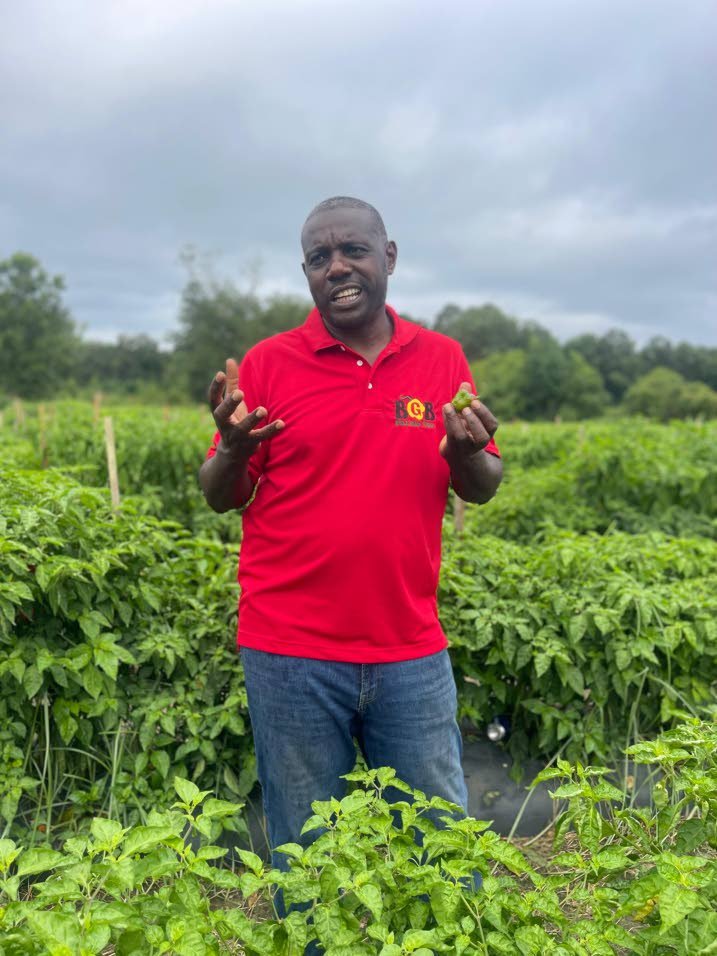Dr Bravo Brown speaking passionately about his pepper farm in Quincy, Florida, during a recent visit by a team from the Jamaica Observer.
WHAT began in the fields of Duanvale, Trelawny, with a boy tending to livestock and planting and harvesting crops has blossomed into one of the most inspiring agricultural success stories of the Jamaican Diaspora.
Today, Dr Bravo Brown is feeding communities across the United States (US), one pepper at a time, and proving that deep roots and big dreams can bear global fruit.
“It’s in the DNA…My roots in agriculture start back from Duanvale, because my father was an avid sugar cane farmer and he used to do some cattle [rearing]. So I used to be that guy, you know, who used to get up early in the morning when it was time to [tend to] the cattle, and when it was like holiday, we used to go work in the sugar cane field,” the 54-year-old Jamaica-born farmer told the Jamaica Observer.
That early exposure sparked a lifelong passion that has taken him across borders, into classrooms, and ultimately to the forefront of one of the largest Scotch bonnet farms in the US. But his journey was far from smooth.
“When I went to high school — William Knibb Memorial High School — I wasn’t the, I would say, brightest student. So when the decision came, we had to choose between physics and agriculture; I chose agriculture. And, from then, I’ve been doing agriculture…even with the challenges that exist, I just continued in farming. And I must say today, I love it, I really love it,” he explained.
That love carried him to Brown’s Town Community College and then to College of Agriculture, Science and Education (CASE), where he earned his associate degree. Determined to continue his studies, he went to the US in 2001 on a student visa and completed a bachelor’s degree in plant science at Lincoln University.
Opportunity soon knocked again, and he earned a full scholarship to pursue a master’s degree at Florida Agricultural and Mechanical University (FAMU), where he later worked as a research associate. Not long after, he founded BGB Farms Inc in 2014 and then added a PhD in Environmental Science to his growing résumé.
His studies also took him to Ghana, where he trained small-scale farmers in pepper cultivation, and to Brazil, where he conducted doctoral research on Camelina biofuels.
“In Jamaica, we say we are probably sometimes on the lower end, but when you go to Ghana and places like those and you see the challenges that they have, then you know that we in Jamaica, sometimes we’re doing great…I was so pleased to be there to assist them. Although I have the high-tech stuff, I was able to matriculate and tell them the low stuff, and they were very appreciative back in Ghana,” he recounted.
BGB Farms started on a half-acre property. Today, it produces approximately 700,000 pounds of Scotch bonnet peppers yearly on a 20-acre property — making it one of the largest producers of the fiery Caribbean staple in the US. The farm, located in Quincy, Florida, also grows habaneros and pumpkins and manufactures crushed pepper.
But Dr Brown’s vision extends beyond growing quality produce. His roadmap involves building a brand that will find pride of place on shelves across the US, Europe, and Canada.
His success thus far, he told the Sunday Observer, would not have been possible without Carol Hopkins — a veteran farmer who gave him the opportunity that changed the course of his life.
“He owns this land and he owns many more properties. When I started out in 2014, I had half an acre of land, and when I approached him, he assisted me with two acres. When it was harvest time and we harvest and everything, I got some money and I went to Mr Carol and I said, ‘How much do I owe you?’ and he said to me, ‘Treat me as a man should be treated.’ And that is the understanding and agreement that we have until today,” Dr Brown recalled.
Hopkins, now 71, has been farming since he was five years old. His family has tilled the same land since 1820.
Recalling the day he met a determined Dr Brown, Hopkins shared: “Some people from FAMU came up and they wanted to grow pepper. They started off wanting to grow the plants, and then he [Dr Brown] wandered a little bit. He knew what he wanted and I already knew how to do everything…he got the seeds and we planted.”
He attributes Dr Brown’s success to a mix of Jamaican grit, top-tier agricultural practices and a dedication to quality.
“He knows and talks Jamaican, you know? That’s what I say his success is, but he also gets on to people and makes them do right, good quality stuff, and he don’t have any trouble when he gets to the market. He does have good quality [produce] and he handles the cooling and all that pretty good,” Hopkins shared.
Now a seasoned entrepreneur and farmer, Dr Brown is urging aspiring farmers to take agriculture seriously and to treat it as a business.
“Whatever we’re doing, we have to treat it as a business, that’s number one. We have to take it from that standpoint. When you do stuff as a business and you put [in] that time and energy — you have some people, we tend to do more when we’re trying to do stuff for people but [not] when we’re doing stuff for ourselves, we need to put in not 100 per cent but 200 per cent. Treat it as a business,” he insisted.

